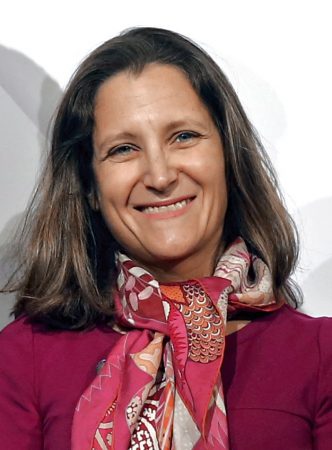
Freeland affirms Arctic co-operation with U.S. despite differences on climate


U.S. Secretary of State Mike Pompeo declined to utter the words "climate change" throughout the eight-country summit of Arctic nations that wrapped Tuesday in Finland

Foreign Affairs Minister Chrystia Freeland. PHOTO: via Wikimedia Commons
MONTREAL—Canada is holding out hope it can collaborate with the Trump administration on Arctic challenges even though the United States has blocked the Arctic Council from issuing a unanimous declaration acknowledging climate change.
U.S. Secretary of State Mike Pompeo declined to utter the words “climate change” throughout the eight-country summit of Arctic nations that wrapped Tuesday in Finland, including in a meeting with Foreign Affairs Minister Chrystia Freeland.
The American opposition to acting on climate change was not all-encompassing, though, because the Trump administration views melting Arctic ice to be an economic opportunity.
Related: Climate change missing as U.S. defends Arctic policy
Pompeo says it will open new sea lanes and trade routes, slashing ships’ travel time between Europe and Asia.
Foreign Minister Timo Soini of Finland, which ended its two-year chairmanship of the council on Tuesday, said no joint declaration was possible because the U.S. would not agree to language about climate change.
Freeland did not back away from discussing climate change, but she tried to find common ground with the U.S. over the sovereignty of the Northwest Passage.
“We have a very close, very fruitful collaboration,” she said. “And actually, as we see the conditions of the Northwest Passage changing with our changing climate, I think that’s actually grounds for closer collaboration with the United States.”
Freeland added that “unpredictable weather patterns caused by climate change” are causing security threats and navigation problems.
In a speech in Finland on Monday, Pompeo called Canada’s claim over the Northwest Passage “illegitimate,” language that was criticized as not reflecting the 1988 Arctic Co-operation Agreement that allows Canada and the U.S. to continue to agree to disagree on the issue.
Related: Pompeo says Canadian claim to Northwest Passage is ‘illegitimate’ [PLANT]
The agreement allows the U.S. to designate the passage as an international waterway while allowing Canada to say that it is a part of Canadian sovereign territory.
The U.S. is more concerned about Russia and China in the Arctic than ownership of the Northwest Passage, said Pompeo.
“The challenges in the Arctic aren’t between the United States and Canada, let me assure you,” he said. “There are others that threaten to use it in ways that are not consistent with the rule of law.”
Pompeo’s views on the economic benefits of climate change met with a muted response during his Monday speech in the northern Finnish Arctic city of Rovaniemi.
“Steady reductions in sea ice are opening new naval passageways and new opportunities for trade, potentially slashing the time it takes for ships to travel between Asia and the West by 20 days,” Pompeo said, as Freeland and the foreign ministers of Denmark, Finland, Iceland, Norway, Russia and Sweden looked on.
“Arctic sea lanes could become the 21st century’s Suez and Panama canals.”
The summit wrapped with a brief joint statement that reaffirmed the council’s “commitment to maintain peace, stability and constructive co-operation in the Arctic.”
—With files from the Associated Press